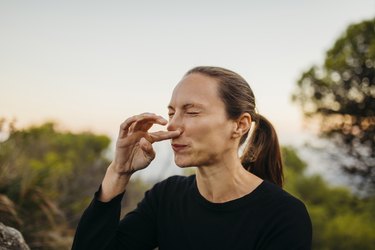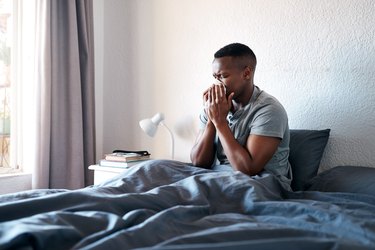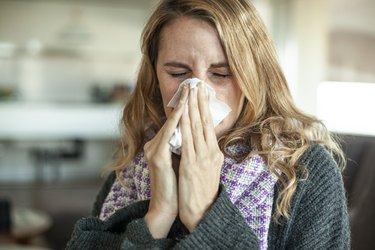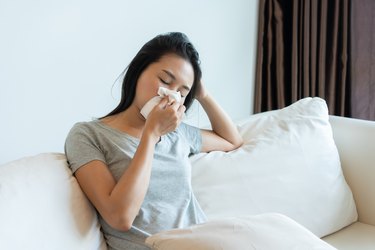
There's no shortage of superstitions about an itchy nose — some people believe an itchy nose means you're about to kiss a fool, while others think it's a sign that trouble is around the corner.
But when you're dealing with the nonstop urge to scratch your snout, you might start to wonder what's really going on up there.
Video of the Day
Video of the Day
Of course, a brief tickle in your nose is usually a tip-off to an impending sneeze. Lingering itching, on the other hand, is usually caused by allergies, environmental irritants or even an upper-respiratory infection, says Abbas Anwar, MD, an otolaryngologist at the Pacific Neuroscience Institute in Los Angeles.
Here's how to figure out what might be causing your nasal nuisance and the quickest ways to get relief.
1. You Have Allergies
In people with allergies, an itchy nose means you've been exposed to seasonal or environmental allergens like pollen, ragweed, grass and dust mites, which causes the immune system to release the chemical histamine, triggering a sensation of itchiness throughout the body, explains Peter Ashman, MD, an otolaryngologist with ENT and Allergy Associates in New York City.
Histamine can make your eyes, nose and throat itchy and cause other symptoms like congestion, sneezing and red or watery eyes. Allergies can sometimes give you a headache, too.
Fix It
The best way to manage allergy symptoms and stop an itchy nose is by limiting your exposure to the allergen as much as possible, per the American College of Allergy, Asthma, & Immunology (ACAAI).
To ease itching that's already underway, try an oral antihistamine like Claritin ($24.99, Amazon) or Zyrtec ($21.97, Amazon), or an over-the-counter steroid nasal spray like Flonase ($9.70, Amazon), recommends Dr. Anwar. These can also be great dry nose remedies, too.
Applying a dab of a moisturizing ointment like Aquaphor ($11.17, Amazon) or petroleum jelly to the itchy area can help too, he adds.
2. You Have an Upper-Respiratory Infection
Sometimes a cold, COVID-19 or a sinus infection can make your nose or throat itchy.
"Upper-respiratory infections, particularly viruses, tend to also cause the same release of histamine as part of the body's immune response," Dr. Ashman says.
It's not always easy to tell a cold from allergies. You're likely dealing with a viral infection if you have a cough or sore throat, you feel achy or tired, or you have a fever, the Mayo Clinic notes.
Itchy eyes, on the other hand, are often a telltale sign of allergies.
Fix It
Rest and plenty of fluids are the best ways to beat a viral illness. For itch relief in particular, "try saline nasal spray or drops, or apply moisturizing ointment to the inside of your nostrils," Dr. Anwar recommends.
They won't cure your cold, but they can temporarily ease your nasal symptoms and make you more comfortable.
Here are some products to try:
- Arm & Hammer Simply Saline Nasal Mist ($8.19, Amazon)
- Little Remedies Saline Spray and Drops ($3.82, Walmart.com)
- Ayr Saline Nasal Gel With Soothing Aloe ($3.62, Amazon)
3. You're Reacting to an Irritant
For some people, especially those with allergies, breathing in smoke, chemicals (like from cleaning products or pollutants) or strong odors (like from air fresheners, perfumes or even scented candles) can cause an itchy nose.
"Like allergens, irritants can trigger the release of histamines due to the body recognizing the irritant as a foreign substance," Dr. Ashman says.
You might also start to cough or feel a burning sensation in your nose.
Fix It
Steer clear of irritants that tend to make you itchy, or wear a mask if you can't avoid them.
You can also rinse your nasal passages with a nasal saline solution to wash away irritants that are already making you itch, Dr. Anwar recommends. Try NeilMed's Sinus Rinse ($8.99, Amazon) or Neti Pot ($14.67, Amazon).
4. You Have a Nasal Polyp
Nasal polyps are soft, painless nasal growths that can develop from inflammation caused by allergies, asthma or frequent infections, according to the Mayo Clinic.
They're harmless and often go completely unnoticed. But sometimes they can make you congested, cause a runny nose or interfere with your sense of smell or taste.
"They can also cause nasal itching in some cases, but it's less common," Dr. Anwar says.
Fix It
If a nasal polyp is causing itching or irritation, your doctor might prescribe a nasal, oral or injectable corticosteroid to reduce inflammation and shrink the polyp. Polyps can also be removed surgically if medication isn't helpful, per the Mayo Clinic.
5. You Have a Nasal Tumor
In rare cases, nasal itching could potentially stem from a tumor in the nose or sinuses. But it's not a common symptom, Dr. Ashman points out.
"The main early symptoms are usually prolonged congestion, nosebleeds and a loss of smell or taste," he says.
Fix It
See your doctor right away if you think you could have a nasal tumor. "They require prompt diagnosis and treatment with surgery, radiation therapy, chemotherapy or immunotherapy," Dr. Anwar says.
When to See a Doctor About an Itchy Nose
More often than not, an itchy nose is caused by minor problems like allergies, a cold or an irritant. But itching that won't ease up could be a sign of an underlying problem.
Let your doctor know if over-the-counter treatments like antihistamines or nasal sprays aren't easing your itchy nose, or if the itch is accompanied by severe congestion, nosebleeds, very severe headaches, a fever or loss of smell or taste, Dr. Ashman recommends.
Was this article helpful?
150 Characters Max
0/150
Thank you for sharing!
Thank you for your feedback!
Is this an emergency? If you are experiencing serious medical symptoms, please see the National Library of Medicine’s list of signs you need emergency medical attention or call 911.


